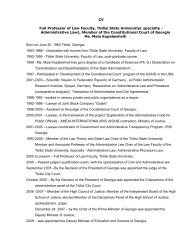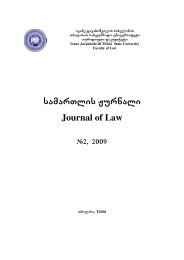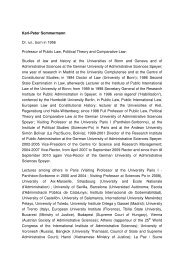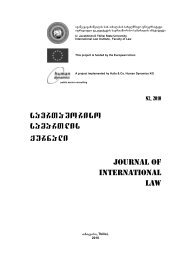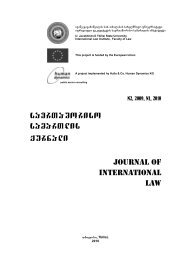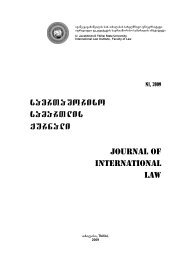Untitled
Untitled
Untitled
Create successful ePaper yourself
Turn your PDF publications into a flip-book with our unique Google optimized e-Paper software.
E. SIRADZE, JURISDICTION OF THE COASTAL STATE OVER THE SHIP OF FOREIGN STATE...<br />
or by a diplomatic agent or consular officer<br />
of the flag State; and<br />
4. Such measures are necessary for the suppression<br />
of illicit traffic in narcotic drugs<br />
or psychotropic substances.<br />
The second case refers to the situation<br />
when the ship enters into the territorial sea<br />
from internal waters where it has committed a<br />
crime. In this case the coastal State is entitled<br />
to take any measure against such vessel, i.e.<br />
its jurisdiction is not limited. It comes from the<br />
unlimited criminal jurisdiction of the coastal<br />
State in its internal waters.<br />
The third case refers to ships, which have<br />
committed a crime before entering the territorial<br />
water from the high seas. In this case the<br />
criminal jurisdiction of the coastal State does<br />
not extend except as provided in part XII of<br />
the Convention. the abovementioned regulation<br />
is based on the fundamental principle of<br />
the Law of the Sea stating that only flag State<br />
jurisdiction is extended over the ship in the<br />
high sea. 44<br />
Under paragraph 2 of Article 220 of the<br />
Convention, the coastal State is entitled to inspect<br />
or/and detain the vessel not only in case<br />
of violation of its legislation on environmental<br />
protection, but in cases of violation of international<br />
regulations and standards as well. Finally<br />
in accordance with paragraph 2 of Article<br />
25, the coastal State has the right to take<br />
necessary steps to prevent breach of regulations<br />
on the entry into ports. Certainly, such<br />
steps may be undertaken in the territorial sea.<br />
The example of Norway as one of the traditional<br />
developed maritime State is interesting<br />
whilst discussing the issue of executive<br />
jurisdiction of the coastal State in the territorial<br />
sea. According to its legislation vessel may<br />
be detained for violation of local laws and regulations<br />
in the territorial sea, among them,<br />
concerning manning and construction. 45 However,<br />
Article 22 of the Convention forbids the<br />
coastal State to adopt law on manning and<br />
construction of vessels in innocent passage<br />
in a territorial sea.<br />
In accordance with section 89 of the Code<br />
of the USA on the Protection of Coast, the<br />
coast guard personnel are entitled to exercise<br />
examination, inspection, investigation, detention<br />
and arrest of vessels under the jurisdiction<br />
of the United State in order to execute the<br />
laws of the United States. 46 Furthermore, for<br />
exercising activities aimed at avoiding contraband<br />
outside from the coast, it is necessary<br />
for the coast guard of the USA to have jurisdiction<br />
over the vessels as well as over the<br />
actions there in. 47 If the officials of the coast<br />
guard of the USA discover the violations on<br />
USA vessel or on a vessel under the jurisdiction<br />
of the USA, they are entitled to take the<br />
vessel into the port, arrest and/or fine responsible<br />
persons and confiscate the vessel itself<br />
and/or impose a fine on it. 48<br />
HOT PURSUIT<br />
One of the guarantees to exercise the<br />
executive jurisdiction by the coastal State, over<br />
the internal waters and the territorial sea, is<br />
the right of hot pursuit, which is granted under<br />
the Convention. In accordance with Article 111<br />
of the Convention, hot pursuit may be undertaken<br />
when a foreign ship or her boats are<br />
within the internal waters, the territorial sea,<br />
the contiguous zone, the archipelagic waters<br />
of the pursuing State. The right of a hot pursuit<br />
is one of the oldest norms of the customary<br />
law of the sea. In cases such as ‘The I’m<br />
Alone’ case (1935) 49 the customary law recognised<br />
the right of the coastal State to entitle<br />
its warships to exercise pursuit of a foreign<br />
ship, if she has violated the law of the coastal<br />
State in its internal waters or the territorial sea,<br />
and to detain such a ship on the high sea. In<br />
Behring Sea Fur Seal arbitration it was established<br />
that, hot pursuit shall be immediate …<br />
and shall be in the frames of control. 50<br />
Article 111 of the Convention reflecting the<br />
customary law rule, stipulates that hot pursuit<br />
may be undertaken when the competent authorities<br />
of the coastal State have a good reason<br />
to believe that the ship has violated the<br />
laws and regulations of that State. However,<br />
the Convention does not provide for any difference<br />
in relation to the quality of a violated<br />
law.<br />
However, it is strictly determined from which<br />
zone and for what violation the pursuit may<br />
be commenced. For example, it is prohibited<br />
to commence the pursuit outside the contiguous<br />
zone, against a ship which did not observe<br />
the sanitary regulations in the territorial sea.<br />
Together with the hot pursuit, the doctrine<br />
of constructive presence operates. In other<br />
words, it is not necessary the regulations to<br />
be violated directly by the ship in internal waters<br />
and/or territorial sea, but involvement of<br />
97





